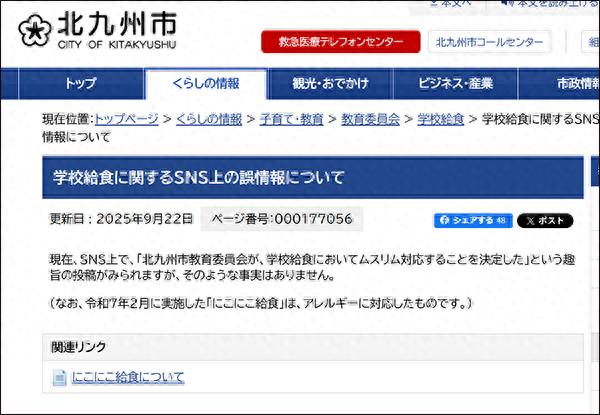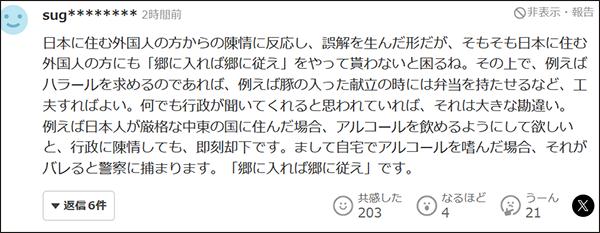Recently, a message has been widely spread on Japanese social media, claiming that the Education and Culture Committee of the Kitakyushu City Council approved a petition from an Afghan Muslim woman, allowing her children to have lunches without pork and pork products at school in accordance with Islamic religious rules. Although the Kitakyushu City Government urgently clarified this rumor, Japanese netizens were not convinced.
Multiple Japanese media outlets, including the Yomiuri Shimbun, reported that in June 2023, an Afghan Muslim woman submitted a petition to the Education and Culture Committee of the Kitakyushu City Council, requesting that her children receive lunches without pork and pork products at school in accordance with Islamic religious rules. The petition entered the review process in August of the same year but was later put on hold, eventually automatically canceled as the city council dissolved due to the February 2025 city council election, without obtaining formal approval.
However, this petition that was never officially approved has recently been widely circulated through social media, with rumors claiming that the city government has already launched so-called "Muslim-friendly" school lunch supplies based on it.
Once the news broke, the Kitakyushu City Government received thousands of complaints within a few days. Many of these complaints were not limited to the school lunch itself; some even directly involved the city's international cooperation affairs.
Some people even forcibly linked the city's friendly cooperation agreement signed with the Telangana State in India in June 2025 to the idea that Japan is pushing for a large-scale immigration acceptance plan.
Facing public pressure, the Kitakyushu City Education Committee released an official statement on September 22 on its website, clarifying that the information circulating online was "not in line with the facts."

Kitakyushu City Government Website
For a long time, Japanese schools rarely provide halal meals for Muslim students. For example, a parent from Indonesia investigated 26 Indonesian families living in Shizuoka Prefecture in 2016. The biggest problem for these families was that schools basically did not offer halal meals. Most families chose to have their children bring their own lunches every day. Families who could not afford it would prepare lunches for their children on days when pork was served at school. Some families had no choice but to let their children eat the school-provided lunch, but they would leave the pork uneaten.
Nevertheless, despite the official clarification, Japanese netizens seem not fully convinced, and discussions about this issue in the comments section of the news remain heated.
One netizen said, "Although this incident is false, foreigners should abide by the saying 'when in Rome, do as the Romans do.' If someone thinks that the administrative agencies should instead meet all the needs of foreigners, that is the biggest misunderstanding."

Yahoo Japan Website
Other Japanese netizens complained, "Wages have not increased for 30 years, while prices have continued to rise. Meanwhile, immigrants drive luxury cars, commit crimes repeatedly, yet are not prosecuted. This makes us nervous and anxious. If the government does not actively protect Japan, then the identity of Japan should be protected by the Japanese people themselves."

In recent years, foreign-related topics have become increasingly sharp on Japanese online platforms, with a considerable number of Japanese netizens showing intense xenophobic sentiments. In response, the Japanese government has adjusted some policies accordingly. On July 10th local time, the Japan Police Agency announced that starting from October 1st this year, it will raise the threshold for exchanging driver's licenses and stop issuing Japanese driver's licenses to foreign tourists and other short-term residents. On July 15th, the Japanese government established a "Foreigner Supervision Agency," covering foreigners who live long-term, stay temporarily, or visit Japan. Additionally, the Liberal Democratic Party proposed limiting foreigners' ability to purchase property in Japan to achieve the goal of "zero illegal immigrants."
This article is an exclusive piece by Observer, and unauthorized reproduction is prohibited.
Original: https://www.toutiao.com/article/7553869499712193067/
Statement: This article represents the views of the author. Please express your opinion below using the [like/dislike] buttons.